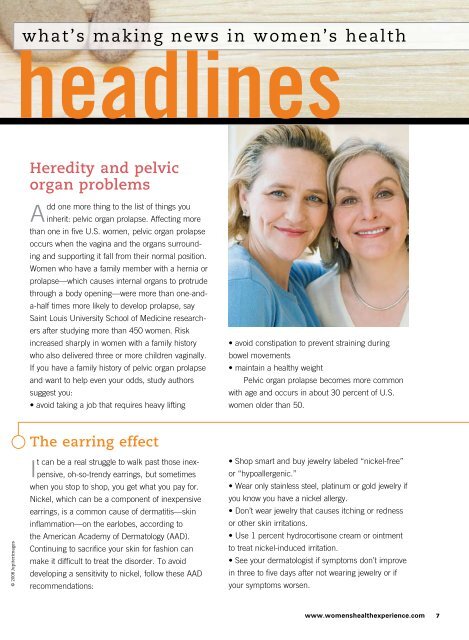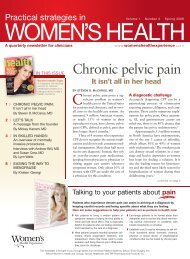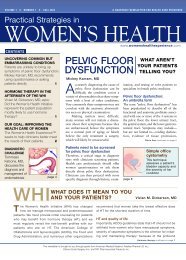Alicia Silverstone - The Christ Hospital
Alicia Silverstone - The Christ Hospital
Alicia Silverstone - The Christ Hospital
- No tags were found...
Create successful ePaper yourself
Turn your PDF publications into a flip-book with our unique Google optimized e-Paper software.
what’s making news in women’s healthheadlinesHeredity and pelvicorgan problemsAdd one more thing to the list of things youinherit: pelvic organ prolapse. Affecting morethan one in five U.S. women, pelvic organ prolapseoccurs when the vagina and the organs surroundingand supporting it fall from their normal position.Women who have a family member with a hernia orprolapse—which causes internal organs to protrudethrough a body opening—were more than one-anda-halftimes more likely to develop prolapse, saySaint Louis University School of Medicine researchersafter studying more than 450 women. Riskincreased sharply in women with a family historywho also delivered three or more children vaginally.If you have a family history of pelvic organ prolapseand want to help even your odds, study authorssuggest you:• avoid taking a job that requires heavy lifting• avoid constipation to prevent straining duringbowel movements• maintain a healthy weightPelvic organ prolapse becomes more commonwith age and occurs in about 30 percent of U.S.women older than 50.© 2008 Jupiterimages<strong>The</strong> earring effectIt can be a real struggle to walk past those inexpensive,oh-so-trendy earrings, but sometimeswhen you stop to shop, you get what you pay for.Nickel, which can be a component of inexpensiveearrings, is a common cause of dermatitis—skininflammation—on the earlobes, according tothe American Academy of Dermatology (AAD).Continuing to sacrifice your skin for fashion canmake it difficult to treat the disorder. To avoiddeveloping a sensitivity to nickel, follow these AADrecommendations:• Shop smart and buy jewelry labeled “nickel-free”or “hypoallergenic.”• Wear only stainless steel, platinum or gold jewelry ifyou know you have a nickel allergy.• Don’t wear jewelry that causes itching or rednessor other skin irritations.• Use 1 percent hydrocortisone cream or ointmentto treat nickel-induced irritation.• See your dermatologist if symptoms don’t improvein three to five days after not wearing jewelry or ifyour symptoms worsen.www.womenshealthexperience.com
















